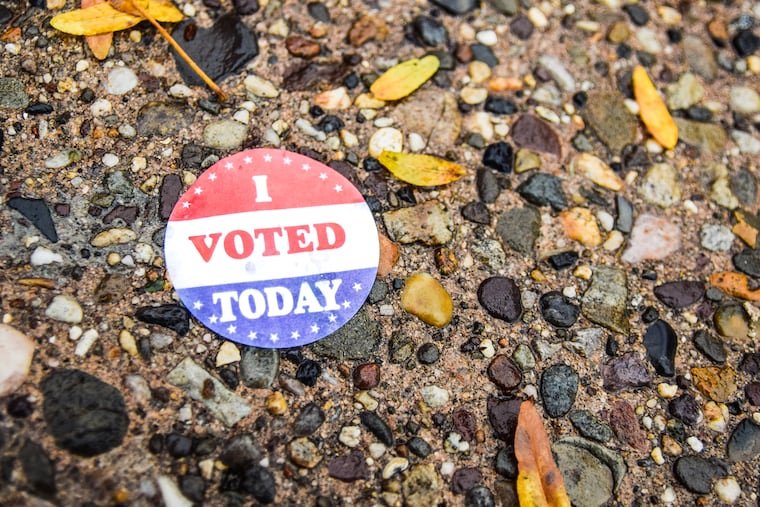Partisan prejudice: Philly and its suburbs are loaded with it | John Baer
When the nation's political divide gets measured at the county level, the Philadelphia region registers as a leader in division.

Would it surprise you to know that in Philadelphia and its collar counties, Democrats are less tolerant of Republicans than Republicans are of Democrats?
That’s among findings reported by the Atlantic in an interesting new piece on partisan prejudice nationwide, which (no surprise) is on the rise.
Everyone knows we’re a nation divided. This piece pinpoints places.
It offers county-by-county breakdowns by the analytic firm PredictWise showing exactly where political prejudice levels are high and low.
Turns out that in Philly, Democrats are “considerably more” prejudiced against Republicans than are Democrats elsewhere in the nation.
You not like us? We don’t like you.
(Did you just think of Philly sports fans?)
This is despite Republicans’ presenting no threat to Democrats in a city and county where D’s outnumber R’s by nearly 700,000 registered voters.
What? Philly Dems are just mean-spirited?
“I don’t know who they’re talking to,” says Democratic City Committee chief Bob Brady. “They didn’t talk to me. One of my closest personal friends is [Philly GOP Chairman] Michael Meehan.”
When I note that party people often have alliances and friendships, and that this is more about average voters, Brady says, “Then it’s probably about Trump. They all hate Trump, and probably paint all Republicans with the same brush.”
Which makes sense. When it comes to party, people might disagree. When it comes to Trump, pull up the drawbridge and flame the arrows.
Oh, by the way, the same “considerably more” prejudiced against Republicans applies to Dems in Bucks, Chester, Delaware and Montgomery Counties, which, except for Chester, have Democratic registration edges.
But R’s around these parts are mostly better behaved.
While Republicans in Chester and Bucks Counties despise D’s at the “considerably more” level, it’s a softer, gentler GOP in Philly, Delco, and Montco.
In Philly, R’s are “considerably less” prejudiced against D’s. In Delco and Montco, R’s are only “somewhat more” prejudiced than elsewhere.
Montgomery County GOP Chair Liz Preate Havey says that makes sense to her.
“I think Republicans are just more conservative about jumping to conclusions, and are less judgmental on partisan issues,” she says.
And as to D’s loathing R’s?
“We certainly feel it on the ground. People being bullied because they like the president. People disliked because they are Republicans. … It’s wrong,” she says. “We’re all human beings. We want to get along with our neighbors.”
Such are the times, eh?
Incidentally, over in Jersey, political prejudice is more mixed. Gloucester County Dems, for example, are only “somewhat” more prejudicial. Same for Camden County R’s.
Nationally, findings suggest political tolerance lives in places such as upstate New York and parts of North Carolina. Go figure.
The least tolerant states appear to be Florida and Massachusetts. In both, registered D’s outnumber registered R’s.
But try this on. The piece reports that the most politically intolerant Americans tend to be whiter, older, more educated, and urban.
Lean that up against the stereotypical less-educated, blue collar, rural and suburban Trump-rally crowd often painted as, well, deplorable. Or immigrants, who lately seem to have a fair case for fevered partisanship.
And the white/older finding is underscored in the Atlantic with a shout-out to Penn poli sci prof Diana Mutz and her 2006 book, Hearing the Other Side.
She found that white, highly educated people tend to be politically isolated, rarely talk with those who disagree with them, and, therefore have “the least amount of political disagreement in their lives.” In other words, no political diversity.
Finally, the piece includes what looks like support for the views of Brady and Havey that Trump drives the data.
It notes a 2014 Pew Research Center survey: 50 percent of conservatives want to live in a community where others share their political views; 35 percent of liberals do. GOP less tolerant.
It cites a 2018 survey by the Public Religion Research Institute: 45 percent of Democrats would be unhappy if their child married a Republican; 35 percent of Republicans would be unhappy if their child married a Democrat. Democrats less tolerant.
What’s different between 2014 and 2018? I think you know.
Donald Trump didn’t create our political divide. But he reshaped and widened it.
Which raises a thought-provoking question: Where do we go from here?